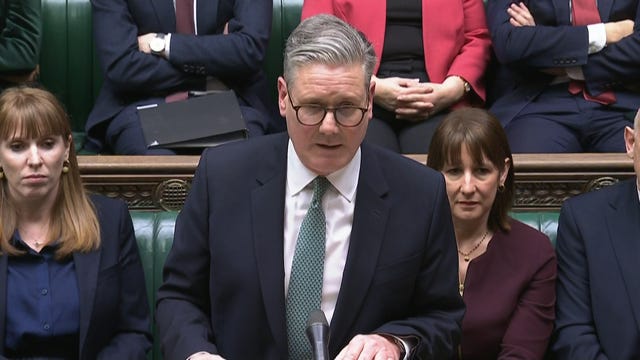Starmer slashes aid to fund biggest increase in defence spending since Cold War
The Prime Minister set out plans for defence spending to reach 2.7% of gross domestic product in 2027.

Sir Keir Starmer has slashed the aid budget to fund a dramatic increase in defence spending in response to “tyrant” Vladimir Putin and uncertainty over US President Donald Trump’s commitment to European security.
The Prime Minister said spending on defence will rise from its current 2.3% share of the economy to 2.5% in 2027.
That will mean spending £13.4 billion more every year from 2027, something which Sir Keir acknowledged will require “extremely difficult and painful choices”.
He said he wants that figure to reach 3% of gross domestic product during the next parliament.
But to fund it, development assistance aid will be slashed from its current level of 0.5% of gross national income to 0.3% in 2027.
Sir Keir said the plan amounts to “the biggest sustained increase in defence spending since the end of the Cold War”.
Taking spending on the security and intelligence services into account as well as defence, the budget will amount to a 2.6% share of the economy from 2027.
“We must change our national security posture, because a generational challenge requires a generational response,” he said.
“That will demand some extremely difficult and painful choices.
“And through those choices, as hard as they are, we must also seek unity, a whole society effort that will reach into the lives, industries and the homes of the British people.”
Following his statement to the Commons, the Prime Minister will deliver a statement on defence from Downing Street at 5pm on Tuesday.
Sir Keir will travel to Washington later this week for talks with the US president, who has repeatedly pushed for Europe to increase its defence spending.
Setting out the need for the UK to respond, the Prime Minister told MPs: “One of the great lessons of our history is that instability in Europe will always wash up on our shores and that tyrants like (Vladimir) Putin only respond to strength.”
He said the UK must stand by Ukraine but “as the nature of that conflict changes, as it has in recent weeks, it brings our response into sharper focus, a new era that we must meet”.
Mr Trump has opened talks with Russian President Mr Putin to end the Ukraine war, putting the transatlantic alliance under severe strain by overriding the concerns of Europe and Kyiv.
The Prime Minister told the Commons: “We must reject any false choice between our allies, between one side of the Atlantic or the other that is against our history, country and party, because it’s against our fundamental national interest.”
The US-UK relationship “survived countless external challenges in the past”.
“So this week, when I meet President Trump, I will be clear I want this relationship to go from strength to strength.”
But Sir Keir, who has been involved in frequent talks with European leaders in recent days, said he will find “new ways to work together” with allies on the Continent.
The Government has a legal duty for aid spending to meet the United Nations target of 0.7% of gross national income, but that has not been the case since it was cut to 0.5% during the pandemic.
In the financial year 2023/24, the Ministry of Defence spent around £53.9 billion. According to documents from last October’s Budget, this was predicted to increase to £59.8 billion by 2025/26 under the old funding models, a rise of 2.3%.
However, Sir Keir told the Commons on Tuesday that the changes will mean “spending an £13.4 billion more on defence every year from 2027”.
Even with the increases, Defence will not be near the top of the list of the Government departments with the largest expenditure. The Department of Health and Social Care spent around £188.5 billion in 2023/24, projected at last year’s Budget to hit £214.1 billion by 2025/26.
However, the Institute for Fiscal Studies has suggested the increase in spending on defence will amount to around £6 billion per year, rather than the £13.4 billion cited by the PM.
IFS associate director Ben Zaranko warned that cuts to aid “won’t be enough” if defence spending is to increase beyond 2.5%, but also said Sir Keir had announced a “misleadingly large figure for the ‘extra’ defence spending”.
He said: “An extra 0.2% of GDP is around £6 billion, and this is the size of the cut to the aid budget. Yet he trumpeted a £13 billion increase in defence spending.
“It’s hard to be certain without more detail from the Treasury, but this figure only seems to make sense if one thinks the defence budget would otherwise have been frozen in cash terms.”
Sir Keir said cutting it to 0.3% was “not an announcement I am happy to make” but “at times like this the defence and security of the British people must always come first, that is the number one priority of this Government”.

Aid organisations reacted with fury to the Prime Minister’s decision.
Romilly Greenhill, chief executive of Bond, the umbrella organisation for international development and humanitarian assistance groups, said: “This is a short-sighted and appalling move by both the PM and Treasury.
“Slashing the already diminished UK aid budget to fund an uplift in defence is a reckless decision that will have devastating consequences for millions of marginalised people worldwide.”
Tory leader Kemi Badenoch backed the cut in aid to fund defence and urged Sir Keir to take up her suggestion of also raiding the welfare budget to boost spending on the military.
“I’m very pleased to hear the Prime Minister announce that increase to 2.5% by 2027. All of us on this side of the House welcome that, we have all wanted to see more spending on defence,” she said.





